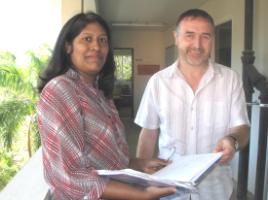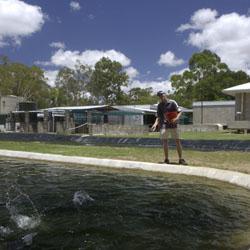Scientists harness sun to disinfect aquaculture ponds
Published on 13 August, 2009
CQUniversity scientists hope to harness sunshine to disinfect aquaculture pond systems, reducing the chance that antibiotics or other treatment residues will get into the food chain...
Their proposed system - which has great potential in tropical areas throughout the Asia-Pacific - involves circulating pond water across a glass plate covered with a thin film of titanium dioxide, which acts as a solar disinfection catalyst without becoming a residue.
CLICK HERE for VIDEO interviews

Sadia Jihan Khan and Professor Rob Reed discuss the project
CQUniversity PhD scholar Sadia Jihan Khan is in the design phase of the research, under the supervision of biologist Professor Rob Reed and engineer Dr Mohammad Rasul.
Sadia spent her early life and study years in Bangladesh before doing her Masters research in New Zealand. She has recently moved to Rockhampton with her family to progress the project.
The project team are carrying forward the ancient practice of using sunlight for water purification. The germicidal effect of natural sunlight has been understood for a long time and recent studies have focused on storing water in a small clear container that is then exposed to sunlight.
Sadia's project focus is a common luminous bacterium, Vibrio harveyi that is often associated with disease in prawn hatcheries, causing high rates of mortality in the prawn culture industry world-wide.
 Once her pilot-scale system is ready, she will be able to record its success at killing the bacterium under various sun conditions, flow rates and angles of the plate.
Once her pilot-scale system is ready, she will be able to record its success at killing the bacterium under various sun conditions, flow rates and angles of the plate.
"The economic significance of the project is considerable," Sadia says.
"At present, bacterial and viral disease must be treated using antibiotics and similar chemical approaches, creating problems at the retail level when antibiotic residues are present, as well as leading to the development of antibiotic-resistant bacteria, with consequences for animal and human use of such antibiotics.
"This project will enable such antibiotics to be replaced by a low-cost, sustainable approach leaving no residual chemicals in the water and thereby improving the quality of the prawn stock."

